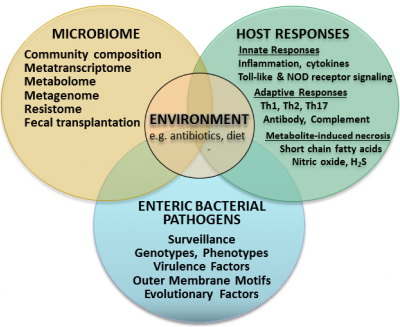Linda S. Mansfield, MS, VMD, PhD, DACVM

University Distinguished Professor,
Albert C. and Lois E. Dehn Endowed Chair, Large Animal Clinical Sciences
Contact Information
Email: mansfie4@cvm.msu.edu
Phone: 517-884-2027
Address: Food Safety and Toxicology
1129 Farm Lane, Rooms 181, 177A and B
Michigan State University
East Lansing, MI 48824
Education
BS, 1975, University of Delaware
MS, 1980, University of Delaware
VMD, 1986, University of Pennsylvania
PhD, 1990, University of Pennsylvania
Postdoctoral Fellow, Agricultural Research Service, USDA

Comparative Enteric Diseases Laboratory
Our lab focuses on how host-microbiota-pathogen interactions govern enteric health and disease. We study the inter-relationships among factors mediating diarrheal disease:
- Enteric bacterial pathogens
- Enteric microbiome
- Host responses controlling susceptibility, resistance, or autoimmunity/allergy
Host-Microbiota-Campylobacter Interaction Studies - A primary focus is to understand the relationship of the gut microbiome to acute and chronic diarrheal illness caused by the foodborne pathogen Campylobacter jejuni. C. jejuni causes 1.3 million cases of diarrhea each year and is a major antibiotic resistant threat. Serious autoimmune diseases can be triggered by C. jejuni including Inflammatory Bowel Disease (IBD), Irritable Bowel Syndrome (IBS) and the neurological disease Guillain Barré Syndrome (GBS).
Campylobacter Evolution and Antimicrobial Resistance (AR) – C. jejuni is a quasi-species with standing variation in its genome that can evolve in real time. This standing genetic variation in contingency genes drives the rapid adaptation of C. jejuni to a novel host and can enhance disease. Antimicrobial resistance genes in C. jejuni and the microbiome affect disease outcomes. We are studying how the rates of AR transfer in the microbiome drive C. jejuni resistance and disease.
Gut-Lung Axis Studies - Alterations in the gut microbiome of infants in early life can increase the risk of developing serious allergies leading to eczema and asthma. We have transplanted germ-free mice with human gut microbiota from infants with and without allergy to investigate the influence of the gut microbial community on development of allergic diseases and to identify potential new evidence-based strategies to prevent initiation of allergies.
Current Projects
- Development of murine models for study of Guillain Barré Syndrome and other autoimmune neuropathies following Campylobacter infection
- Determining the dynamics of AR transfer from commensals to pathogens in the gut microbiome
- Defining the role of the early infant gut microbiome in mediating allergic outcomes associated with asthma in a mouse model
Laboratory Members
Linda S. Mansfield - PI
Julia A. Bell – Lab head
Graduate Students
Azam Ali Sher
Ivon Moya Uribe
Husnain Ahmed
Hinako Terauchi
Undergraduates
Joe Faryean
Sharbel Daher
Ashley Peer
